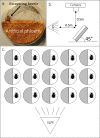Breeding matters: Natal experience influences population state-dependent host acceptance by an eruptive insect herbivore
- PMID: 28207862
- PMCID: PMC5313134
- DOI: 10.1371/journal.pone.0172448
Breeding matters: Natal experience influences population state-dependent host acceptance by an eruptive insect herbivore
Abstract
Eruptive forest insects are highly influential agents of change in forest ecosystems, and their effects have increased with recent climate change. State-dependent life histories contribute significantly to the population dynamics of eruptive forest insect herbivores; however, the proximate mechanisms by which these species shift between states is poorly understood. Laboratory bioassays were conducted using the mountain pine beetle (Dendroctonus ponderosae) to determine the effect of maternal host selection on offspring host preferences, as they apply to population state-dependent behaviors. Female mountain pine beetles exhibited state-dependent preference for artificial host material amended with monoterpenes in the absence of other cues, such that individuals reared in high-density epidemic-state simulations rejected low monoterpene conditions, while low-density endemic-state beetles accepted low monoterpene conditions. State-specific behavior in offspring was dependent on rearing conditions, as a function of maternal host selection, and these effects were observed within one generation. Density-dependent host selection behaviors exhibited by female mountain pine beetle offspring is reinforced by context-dependent maternal effects arising from parental host selection, and in situ exposure to conspecifics. These results demonstrate potential proximate mechanisms that control population dynamics in eruptive forest insects, and will allow for more accurate predictions of continued impact and spread of these species.
Conflict of interest statement
Figures



Similar articles
-
Low offspring survival in mountain pine beetle infesting the resistant Great Basin bristlecone pine supports the preference-performance hypothesis.PLoS One. 2018 May 1;13(5):e0196732. doi: 10.1371/journal.pone.0196732. eCollection 2018. PLoS One. 2018. PMID: 29715269 Free PMC article.
-
Pheromone Production by an Invasive Bark Beetle Varies with Monoterpene Composition of its Naïve Host.J Chem Ecol. 2015 Jun;41(6):540-9. doi: 10.1007/s10886-015-0590-x. Epub 2015 May 27. J Chem Ecol. 2015. PMID: 26014128
-
Chemical similarity between historical and novel host plants promotes range and host expansion of the mountain pine beetle in a naïve host ecosystem.New Phytol. 2014 Feb;201(3):940-950. doi: 10.1111/nph.12573. Epub 2013 Oct 30. New Phytol. 2014. PMID: 24400902
-
Phytochemicals as mediators for host range expansion of a native invasive forest insect herbivore.New Phytol. 2019 Feb;221(3):1268-1278. doi: 10.1111/nph.15467. Epub 2018 Oct 6. New Phytol. 2019. PMID: 30291808 Review.
-
Mountain Pine Beetle Epidemic: An Interplay of Terpenoids in Host Defense and Insect Pheromones.Annu Rev Plant Biol. 2022 May 20;73:475-494. doi: 10.1146/annurev-arplant-070921-103617. Epub 2022 Feb 7. Annu Rev Plant Biol. 2022. PMID: 35130442 Review.
Cited by
-
Naïve Pine Terpene Response to the Mountain Pine Beetle (Dendroctonus ponderosae) through the Seasons.J Chem Ecol. 2023 Jun;49(5-6):299-312. doi: 10.1007/s10886-023-01418-1. Epub 2023 Mar 16. J Chem Ecol. 2023. PMID: 36929332
-
Selection of entomopathogenic fungus Beauveria bassiana (Deuteromycotina: Hyphomycetes) for the biocontrol of Dendroctonus ponderosae (Coleoptera: Curculionidae, Scolytinae) in Western Canada.Appl Microbiol Biotechnol. 2021 Mar;105(6):2541-2557. doi: 10.1007/s00253-021-11172-7. Epub 2021 Feb 15. Appl Microbiol Biotechnol. 2021. PMID: 33590267
-
The cytochrome P450 CYP6DE1 catalyzes the conversion of α-pinene into the mountain pine beetle aggregation pheromone trans-verbenol.Sci Rep. 2019 Feb 6;9(1):1477. doi: 10.1038/s41598-018-38047-8. Sci Rep. 2019. PMID: 30728428 Free PMC article.
References
-
- Royama T. Analytical population dynamics. New York: Chapman and Hall; 1992. 380 p.
-
- Cooke BJ, Nealis VG, Régnière J. Insect defoliators as periodic disturbances in northern forest ecosystems In: Johnson E, Miyanishi K, editors. Plant Disturbance Ecology: The Process and the Response. Elsevier; 2007. p. 487–525.
-
- Raffa KF, Aukema BH, Bentz BJ, Carroll AL, Jeffrey A, Turner MG, et al. Cross-scale drivers of natural disturbances prone to anthropogenic amplification: The dynamics of bark beetle eruptions. Bioscience. 2008;58:501–17.
-
- Chitty D. Population processes in the vole and their relevance to general theory. Can J Zool. 1960;38:99–113.
MeSH terms
Substances
LinkOut - more resources
Full Text Sources
Other Literature Sources

